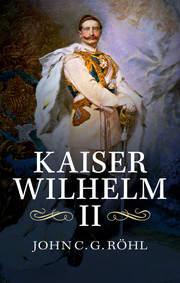Book contents
- Frontmatter
- Dedication
- Contents
- List of figures
- Acknowledgements
- Preface to the English edition
- Preface to the German edition
- Acknowledgements
- Overview: Wilhelm the Last, a German trauma
- Part I 1859–1888: The Tormented Prussian Prince
- 1 The ‘soul murder’ of an heir to the throne
- 2 Ambivalent motherhood
- 3 A daring educational experiment
- 4 The conflict between the Prince of Prussia and his parents
- 5 1888: the Year of the Three Kaisers
- Part II 1888–1909: The Anachronistic Autocrat
- Part III 1896–1908: The Egregious Expansionist
- Part IV 1906–1909: The Scandal-Ridden Sovereign
- Part V 1908–1914: The Bellicose Supreme War Lord
- Part VI 1914–1918: The Champion of God’s Germanic Cause
- Part VII 1918–1941: The Vengeful Exile
- Notes
- Index
2 - Ambivalent motherhood
Published online by Cambridge University Press: 05 September 2014
- Frontmatter
- Dedication
- Contents
- List of figures
- Acknowledgements
- Preface to the English edition
- Preface to the German edition
- Acknowledgements
- Overview: Wilhelm the Last, a German trauma
- Part I 1859–1888: The Tormented Prussian Prince
- 1 The ‘soul murder’ of an heir to the throne
- 2 Ambivalent motherhood
- 3 A daring educational experiment
- 4 The conflict between the Prince of Prussia and his parents
- 5 1888: the Year of the Three Kaisers
- Part II 1888–1909: The Anachronistic Autocrat
- Part III 1896–1908: The Egregious Expansionist
- Part IV 1906–1909: The Scandal-Ridden Sovereign
- Part V 1908–1914: The Bellicose Supreme War Lord
- Part VI 1914–1918: The Champion of God’s Germanic Cause
- Part VII 1918–1941: The Vengeful Exile
- Notes
- Index
Summary
These consequences cannot be fully understood without taking into account the consternation felt by Wilhelm’s young mother at the birth of a son who was, in her eyes, ‘deformed’ or ‘crippled’. Vicky, known in Prussia as ‘the Englishwoman’, was barely eighteen years old. Proud of her status as Queen Victoria’s daughter, intelligent, well read, liberal and astonishingly progressive in her ideas and a passionate anglophile, she made no secret of her feelings of superiority at the antiquated, reactionary Prussian court, and was correspondingly unpopular and isolated there. Defiantly, she counted on the accession of her beloved soldier husband Fritz to the throne in the near future, followed by the introduction of a more modern – parliamentary – constitution and an alliance between Prussia and her powerful mother country. With the expected birth of her son it seemed certain that these bright hopes would bear fruit well into the twentieth century. But the little prince had come into the world ‘crippled’, and the Crown Princess felt a constant, almost intolerable sense of shame that he was imperfect. ‘I feel so sore on the subject that when other people make remarks about it I wish myself under the ground or in my shoes or any where [sic],’ she lamented. The flaw had to be removed – and, if the measures prescribed by the doctors failed, the physical handicap would have to be corrected through the child’s upbringing. With the inevitability of a Greek tragedy, these unrealisable hopes led to a vicious circle of reciprocal disappointment, which was to degenerate, on Wilhelm’s side, into hatred and rejection of his mother’s liberal ideals. Many years later, after the catastrophe of the First World War, Sigmund Freud was to pinpoint Vicky’s inability to bond with her handicapped son as the root cause of their fateful estrangement.
- Type
- Chapter
- Information
- Kaiser Wilhelm IIA Concise Life, pp. 10 - 13Publisher: Cambridge University PressPrint publication year: 2014

